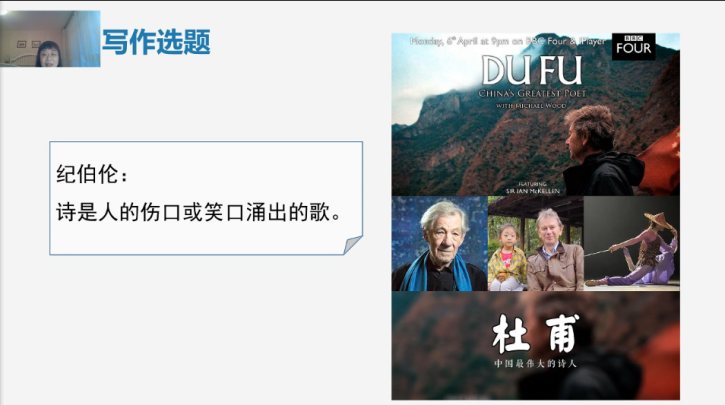The Fourth Lecture of the “Integration of the Arts and the Sciences—‘Reading Workshop on Culture Hum

At 7 p.m., May 28, “Revolutionary Thinking in English Writing: An R&D Innovation Path for the Chinese Dream—Reverse Thinking” by Prof. Liang Xiaohui, the fourth lecture of the “Integration of the Arts and the Sciences– ‘Reading Workshop on Humanities and Ideologies& Politics ’ of the SFS” series was broadcast live on the platform of “2020 Public Broadcast for Professional Education of Teachers in Beijing”. More than 5000 teachers and students participated.
Beginning with a short video, Prof. Liang started with Kahlil Gibran quotes about wounds to introduce her view that choosing the topic of article was like “a song that rises from a bleeding wound or a smiling mouth” and discussed this with students online. She commented on paragraphs written by students and gave suggestions one by one and pointed out three problems with thinking in writing—unclear logic, inexplicit expression, and lack of creativity.

Following the presentation of strategies for training logical thinking and expression skills, Prof. Liang explained the pathway to innovation by introducing the “temporary construction of antonyms” with examples. She suggested that the creative use of “temporary construction of antonyms” in writing could achieve unexpected effects in language expression To improve innovation skills, , she also took students’ assignments, innovative products, posters and advertising ideas for example to broaden their horizons in innovation.
Finally, focusing on the topic of “Chinese culture going global”, Prof. Liang emphasized that college students should undertake the historical mission of spreading Chinese culture and language as well as fulfilling the Chinese dream. She also put forward specific strategies for “Chinese culture going global”, such as the objectivity-oriented Chinese poetry, target-oriented film and television products, and system-oriented associative thinking.
Prof. Liang emphasized that the differences between language majors and non-language majors should not be too pronounced and liberal arts students such as English majors should have a better understanding of sciences and technology while students majoring in science and technology should also value cultural awareness, so as to “integrate the arts and the sciences” and stimulate more diversified creative thinking. At the end of the lecture, she recommended two books — Taking Sides and Factfulness. She encouraged the students to read them quickly using mind-mapping and to acquire the skills of speed reading soon.
Three former lectures of the“Integration of the Arts and the Sciences— ‘Reading Workshop on Culture Humanities and Ideology &Politics’ of the SFS” Series are: “The Application of Chinese and Foreign Classical Thinking in Science”, “How to Improve Learning in the Arts and the Sciences by Fast Reading of Literature and Non-literary texts”, and “How to Argue by Integrating the Arts and the Sciences.”. All of those received a very warm welcome from students and teachers. The fourth lecture was based on innovative writing in English and explored innovative approaches to work and learning. The “Integration of the Arts and the Sciences— ‘Reading Workshop on Culture Humanities and Ideology &Politics’ of the SFS” Series, which lasted nearly a year, has now come to an end
Now, China is exploring the concepts of “new disciplines of engineering and liberal arts” and universities are encouraged to implement the spirit of national ideological and political conferences, and to introduce ideological and political education into classrooms. Against this background, The Integration of the Arts and the Sciences—‘Reading Workshop on Culture Humanities and Ideology &Politics’ of the SFS” Series is an innovative attempt to integrate the study of the liberal arts and the sciences, ideological education, and professional learning, and has achieved good results. In the future, the SFS will continue to innovate its teaching methods under the guidance of the fundamental task of “fostering virtue through education”, andtake full advantage of foreign language majors to provide a more effective platform for our students that combines the humanities and the social sciences and integrates ideological education into professional study.
